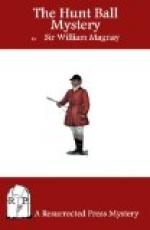The police authorities committed themselves to no definite theory at that stage, and at their request the inquiry was adjourned for a month.
Morriston, leaving the hall with Kelson and Gifford, asked them to walk back with him to Wynford Place.
“Let us throw off this depressing business as well as we can,” he said. “Of course I have had to break it to my sister and the others; they would have seen it to-day in print. Thank goodness the papers don’t look beyond the suicide idea, so they are not making much fuss about it. If they took a more sensational view, as I fear they will now after the medical evidence, it would be a terrible nuisance.”
“I hope the ladies were not much upset when you told them,” Gifford remarked.
“Well, they already had an idea that something was seriously wrong, and that took the edge off the announcement. Of course they were horribly shocked at the idea of the tragedy so close at hand, though I softened the details as well as I could.”
“If the suicide idea is to be abandoned,” said Kelson, speaking with an unusually gloomy, preoccupied air, “the police have an uncommonly difficult and delicate task before them.”
“Yes, indeed,” Morriston responded. “And I should say that abnormally keen person, the brother, will keep them up to collar.”
“He means to,” Kelson replied rather grimly. “We had him for an hour last night cross-examining us, naturally to no purpose; we could tell him nothing.”
“He won’t leave a stone unturned,” Morriston said. “He proposes to return here after the funeral in town.”
“And I should say,” observed Kelson, “if the mystery is to be solved he is the man to solve it. What do you think, Hugh?”
Gifford seemed to rouse himself by an effort from an absorbing train of thought. “Oh, yes,” he answered. “Except that it is possible to be a little too clever and so overlook the obvious.”
“If,” said Morriston, obsessed by the subject, “the case is not one of suicide it must be one of murder. Where is Mr. Gervase Henshaw, or any one else, going to look for the criminal?”
“Not among your guests, let’s hope,” Kelson said with a touch of uneasiness.
“For one thing,” Morriston replied, “they, or a good part of them, were not exactly my guests. I can’t tell who may have got a ticket and been present. There was a great crowd. We may have easily rubbed shoulders with the murderer, if murder it was.”
“Yes, so we may,” said Kelson alertly, though with something of a shudder.
“Not a pleasant idea,” continued Morriston. “But I don’t see, if a bad character did get in and mix with the company, why he should have done a fellow guest to death, nor how he contrived to leave his victim and get out of the room after he had locked the door.”
“If the two men had a row over a girl, or anything else,” Kelson said, “there is still that difficulty to be surmounted.”




